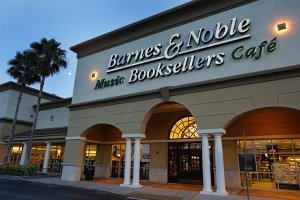 The New York Times story last week regarding bricks and mortar AND online bookstore Barnes and Noble noted that The nation’s largest bookstore chain, Barnes & Noble said on Tuesday that its revenue decreased 8 percent, to $1.7 billion, in the quarter that ended Oct. 26. Profits actually increased mainly due to cost-cutting. Frankly I expected the news to be even worse. What also was interesting to me was the note that e-book sales were flattening.
The New York Times story last week regarding bricks and mortar AND online bookstore Barnes and Noble noted that The nation’s largest bookstore chain, Barnes & Noble said on Tuesday that its revenue decreased 8 percent, to $1.7 billion, in the quarter that ended Oct. 26. Profits actually increased mainly due to cost-cutting. Frankly I expected the news to be even worse. What also was interesting to me was the note that e-book sales were flattening.
The constant drumbeat that bookstores will eventually be extinct is tiresome and I believe incorrect. I am very happy to read books (newspapers and magazines) on my Amazon Kindle Fire. But I also like to walk into a bookstore and browse books (particularly books I might not take a second look at if I were browsing online) maybe buy one or two, have a cup of coffee and just enjoy the great vibe that is part of a good bookstore. Those are just some of the reasons that I believe bookstores will survive and perhaps even thrive.
Not to be blind to what has already transpired as it relates to independent bookstores (think about the 1998 Tom Hanks and Meg Ryan movie You’ve got Mail which in addition to being strangely dated, also forecast the downfall of independent bookstores), the bricks and mortar bookstore industry will never regain its former glory but that doesn’t mean they will not be relevant.
Lately there’s been much discussion about how the practice of retail store ‘showrooming’ is no longer feared by big box retailers like Best Buy. In fact retailers are embracing customer (and potential customer) use of mobile phones in the store and are taking the opportunity to match prices offered by online providers while the customers is still inside the store. The opportunity to sell these customers additional products raises the average basket sufficiently enough to make this a worthwhile practice. The same should be true of bookstores.
The experience of online browsing of books pales in comparison to the experience in a brick and mortar bookstore. At least once you actually arrive at the bookstore. I highly doubt I will get much of an argument on that point. The wonderful variety of book jacket covers, various thicknesses of books on the shelves (does it ever bother you like it does me that I never really know how much I have left to read in a digital book but ALWAYS know how far I have to go in a physical book?) makes for an unparalleled and maybe more importantly REAL experience. I pick up books in a bookstore based on look and feel, read a few pages, flip through it and is something I would never do with a digital book.
Forecasting the end of an era like that of bricks and mortar bookstores may make for a newsworthy topic, but most of the time the chatter is just that – and overstated. What would be wrong with a less ubiquitous bricks and mortar industry but one that remains vibrant and relevant?
The end of bookstores is NOT at hand. At least that’s what I am hoping.

The scary issue isn’t the future of bookstores (or libraries, where I happen to work); rather, the future of reading. On the train I see some people with books, others with e-readers — and many with tablets or smartphones. They, the third category, are not downloading a newspaper or novel — rather, playing Angry Birds (or whatever is in this year). An article THE CHRONICLE OF HIGHER EDUCATION described students’ involvement in social media to the detriment of books. Textbooks are too laborious for them. Basically, Twitter & Facebook are taking over. Yes, there might still be readers, just like some people will still ride horses – but as a hobby or subculture. In the end, it won’t matter if JANE EYRE will be read in print (my preference) or a Kindle — or bought on Amazon vs. BN. Will it be read at all? Or will it end up as a museum piece, along with the original printing press?
LikeLike
Thanks as always for your thoughtful comment Hallie. It’s become evident that the way people read today is very different from the way things were even twenty years ago. The way content/books/articles are displayed has been evolving. Shorter paragraphs breaking up long form articles. My hope is this evolution will continue and that long form reading will live long and prosper. I hope.
LikeLike
I read novels on my smartphone all the time. Overdrive has an app for iOS and I borrow ebooks from my library. I’m over 40, so I’m not the Angry Birds-playing, Facebook-and-Twitter-obsessed young person Hallie describes, but some of my twenty-something friends read ebooks on their phones, too. I don’t think reading long-form novels or non-fiction will die just because there are social distractions available on phones, tablets, and computers. Some people don’t enjoy reading — but some people do, and will always, love to read and as long as those people keep teaching children to love to read, we will have long-form books.
LikeLike
You make some very good points Susan and I agree that there are some people that don’t enjoy reading – sad but true. Long-form books are here to stay – both digitally and printed! Thanks for reading and for your thoughtful comment.
LikeLike